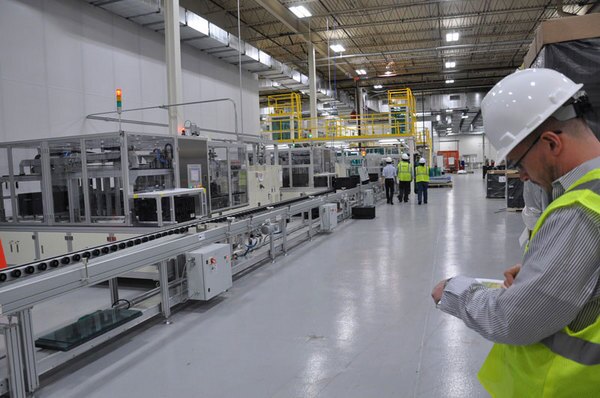Electric Car Battery Manufacturer Files for Bankruptcy

A123's production facility in Livonia, Michigan | A123 Systems photo
The storage battery manufacturer whose products have been linked to fires in Anaheim-based electric car firm Fisker's Karma line filed for bankruptcy Tuesday. A123 Systems, the Waltham, Massachusetts company which supplied flawed lithium-ion batteries to Fisker, filed for Chapter 11 protection as it missed a $2.7 million payment on loan interest on October 15.
A123 received $249 million in Department of Energy stimulus funds in 2009 to develop two manufacturing plants in Michigan. The firm is the fifth to go bankrupt after receiving Department of Energy stimulus funds.
Though the filing went unremarkaed upon in Tuesday's Presidential debate, Romney spokesperson Andrea Saul released a statement saying that the bankruptcy filing was "yet another failure for the president's disastrous strategy of gambling away billions of taxpayer dollars on a strategy of government-led growth that simply does not work."
A123 also received part of a $2 million grant from the California Energy Commission to develop technologies for grid power storage using its high-operating-temperature lithium ion batteries.
The company missed what might well have been a last chance for solvency when an investment partnership with Chinese auto parts firm Wanxiang Group didn't firm up in time to save A123 from bankrupcty. According to reporter Nathan Bomey in the Detroit Free Press, Wanxiang -- which had prepared to pay $465 million for an 80% stake in the company -- was still interested in acquiring A123.
They'll have to argue with U.S firm Johnson Controls over that: A123 said this week in the announcement that it had filed for bankruptcy that it was selling its automotive division to Johnson Controls. Earlier news of the pending Wanxiang deal were met with disapproval from Congressional Republicans, who questioned the sale of a U.S. stimulus-financed company to a Chinese enterprise.
A possible difference between A123's bankruptcy and that of Solyndra is that A123 is perceived as having assets of greater value, especially in the realm of intellectual property. Production problems leading to the Fisker battery recall certainly sent the company into a tailspin, especially as Fisker -- A123's main client -- is struggling to stay current on its own loan obligations. But many are saying that Johnson Controls -- or whoever picks up A123's fire sale assets -- will likely be able to put them to good and profitable use.
Not everyone agrees, though. GreenTech Media's Eric Wesoff wrote a post Wednesday in which he quoted Vinod Khosla, a greentech venture capitalist, as saying lithium ion batteries such as A123's were of limited value:
Khosla described lithium-ion batteries as "toys that can't be deployed at scale." He said that lithium-ion was "too volatile" and "too expensive." To be economical, energy storage has to be fundamentally safe -- without the necessity to wrap tons of management and safety equipment around it to keep it from exploding or catching fire.
ReWire is dedicated to covering renewable energy in California. Keep in touch by liking us on Facebook, and help shape our editorial direction by taking this quick survey here.